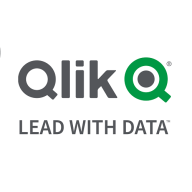

Qlik Replicate and Domo compete in the data management and analytics tools category. Based on feature comparisons, Qlik Replicate has an advantage in data manipulation and transformations, while Domo excels in data visualization and ease of use.
Features: Qlik Replicate offers near real-time data processing with robust Change Data Capture capabilities, supporting a wide range of database connectors with minimal manual intervention. It provides efficient data replication without impacting source database performance. Domo, on the other hand, simplifies data visualization and dashboard creation with its user-friendly interface and Magic ETL feature, which enables data transformation without coding. Domo also supports a wide array of pre-built data connectors, facilitating easy data handling and visualization.
Room for Improvement: Qlik Replicate could improve its user interface and support system by offering clearer error messaging and a more intuitive design. Domo might enhance its ETL capabilities for handling large datasets and expand its chart options to match competitors. Additionally, addressing complexity in calculations and bolstering data integration and governance would benefit Domo users.
Ease of Deployment and Customer Service: Qlik Replicate offers deployment flexibility with Public, Hybrid, and On-premises options, though it faces challenges with technical support response times. In contrast, Domo provides deployment across Public, Private, and Hybrid Cloud environments, focusing on collaborative customer service and engagement during setup and support.
Pricing and ROI: Qlik Replicate is priced higher but offers cost-effectiveness for large enterprises by providing operational savings. Domo's pricing is perceived as high yet justified by its convenience as an end-to-end BI tool, offsetting infrastructure costs and offering quick adoption and ease of use. Both tools deliver ROI through time savings and enhanced business insights.
I conducted a cost comparison with the AWS service provider, and this option is much cheaper than the Kinesis service offered by AWS.
While they eventually provide the correct answers, their support for smaller customers could be improved.
Even priority tickets, which should be resolved in minutes, can take days.
Sigma, which is written for Snowflake, scales more easily than Domo.
End users require a license to run their own reports and dashboards, which are fairly expensive.
It is a core-based licensing, which, especially in the banking industry, results in the system capacity being utilized up to a maximum of 60%.
Domo is expensive compared to other solutions.
Licensing is calculated based on the machine's total capacity rather than actual usage.
I have been using it for four years and have been able to extract the information I need from it.
Data retrieved from the system can be pushed to multiple places, supporting various divisions such as marketing, loans, and others.


Domo is a cloud-based, mobile-first BI platform that helps companies drive more value from their data by helping organizations better integrate, interpret and use data to drive timely decision making and action across the business. The Domo platform enhances existing data warehouse and BI tools and allows users to build custom apps, automate data pipelines, and make data science accessible for anyone through automated insights that can be shared with internal or external stakeholders.
Find more information on The Business Cloud Here.
Qlik Replicate is a data replication solution for replicating data from one source database to another for business intelligence software. It offers data manipulation and transformations, replication without impacting source databases, and ease of use without needing ETL. The solution is stable and user-friendly, with detailed logging and support.
Qlik Replicate has improved the organization by allowing each team to replicate their data into a single-source data location. The most important feature of Qlik Replicate is its ability to replicate and update records without needing a programmer.
We monitor all Data Integration reviews to prevent fraudulent reviews and keep review quality high. We do not post reviews by company employees or direct competitors. We validate each review for authenticity via cross-reference with LinkedIn, and personal follow-up with the reviewer when necessary.